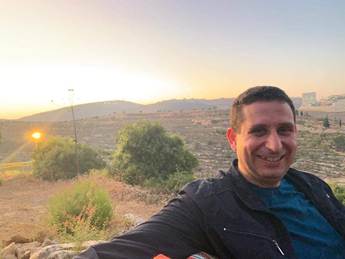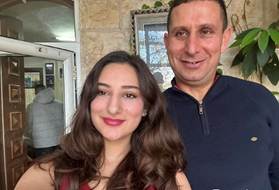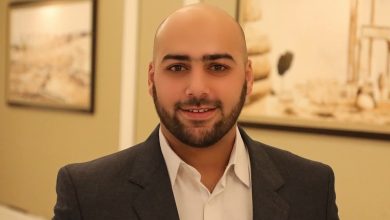
By : Hind Shraydeh
In times of hardship, one finds comfort in the words of the Lord—words that soothe the heart, gently cradle the soul, and hold it tenderly amid the cold and darkness of the world. But even this solace is denied to Palestinian Christian detainees in the prisons of the Israeli occupation.
Since June of last year, the prison administration has continued to stall the delivery of the Holy Bible to detainee Rami Rizq Fadayel from the city of Ramallah, who was taken captive in December 2023.
The Israeli occupation deliberately targets Rami, aiming to rob him of peace with every holiday. Time and again—before, during, and after the joyous feasts of Christmas and Easter—the Israeli army storms his home, blows down the door, and snatches him from the embrace of his family, throwing him into the cursed system of administrative detention. More often than not, a six-month detention order is issued, subject to renewal based on the mood of the captain of the area.
On many occasions, the Israeli occupation forces have raided his house on the eve of a holiday, dragging him away to brutalize him—or, at times, to beat him mercilessly in front of his daughter, Mais—only to withdraw afterward, leaving Rami lying on the ground. As if the sole purpose were to ruin his family’s celebrations, poison their joy, and offer their savage version of a “holiday greeting.”
Rami has spent over 12 years in arbitrary imprisonment, most of it under administrative detention—a form of imprisonment without charge or trial. This practice traces back to the British Mandate’s Emergency Regulations of 1945, under which an Israeli military officer can detain someone based on a secret file—one neither the detainee nor their lawyer is allowed to access. As a result, the detainee remains trapped in a web of fabricated allegations, unable to know the charges against him and thus powerless to defend himself in a court where the judge and jailer are the same.
The gravest danger of administrative detention lies in its open-ended nature. These orders have no fixed limit and can be renewed repeatedly, often stretching into years, stolen from the detainee’s life. This is exactly what is happening to Rami.
Since his most recent arrest, the occupation has renewed Rami’s administrative detention order three consecutive times—the latest on the eve of Christmas 2024. Just two days after that renewal, death struck a cruel blow: Rami’s father passed away. Had it not been for that final extension, Rami might have had the chance to bid his father a last farewell—the father who spent his final breaths murmuring Rami’s name.
Rami only learned of his father’s death weeks later, when a lawyer visited him to deliver the devastating news. Upon hearing it, he had no choice but to bury his grief in silence, to bind the wounds of his loss and gather the shards of his sorrow—so his sadness wouldn’t show, so his jailer wouldn’t rejoice in a moment of weakness. He had to summon his strength and stand tall once more.
Rami is held in the Nagave desert prison, where he endures severe suffering amid the outbreak of a contagious scabies infestation spreading among detainees. This is a direct result of the occupation’s deliberate neglect: the prison is kept in unsanitary conditions, with no disinfectants or cleaning materials provided to the detainees. On top of that comes the systematic medical neglect practiced by the prison authorities, who routinely withhold proper treatment from the imprisoned population, further worsening the situation.
Rami contracted scabies in July of last year and suffered for months from the relentless rash that ravaged his skin. By November 2024, his body was covered in sores and boils that bled from the constant itching and pain. And with the intensified, calculated acts of torture that the prison administration has increasingly employed—especially after October 7, 2023—the disease returned once again, tearing through Rami’s body to this very day.
With family visits suspended and the International Committee of the Red Cross access denied, news of the detainees leaks to their families —passed on by recently released prisoners who share what they’ve witnessed, or through the rare, heavily restricted visits by lawyers. Even then, updates are vague and general, shared with caution out of fear that legal visits too might be cut off entirely.
Families have learned that their sons and loved ones remain in nothing but their underclothes—a result of an unprecedented campaign of collective punishment, marked by cruelty and humiliation. The prison authorities have confiscated detainees’ extra clothing, stripped them of their most basic rights, and rolled back every hard-won gain of the prisoners’ movement, reducing them to mere hostages.
Rami is no exception. He remains in the same undergarments he has worn for a year and a half. He has grown gaunt, his hair matted, his beard long and unkempt—a portrait of slow suffering in silence.
Mais, Rami’s 18-year-old daughter, is in her final year of school and wishes that her father would share the joy of her graduation next month. But the Israeli occupation controls not only the lives of the detainees—it also holds sway over the lives of their families, making even the simplest dreams feel impossible.
Mais says, “Only four holidays—between Christmas and Easter—are all I’ve ever had with my father, because of his repeated arrests. Most of them were under administrative detention.”
She adds with quiet determination, “I study hard for my father. I’ll gift him my success—to bring joy to his heart.”


